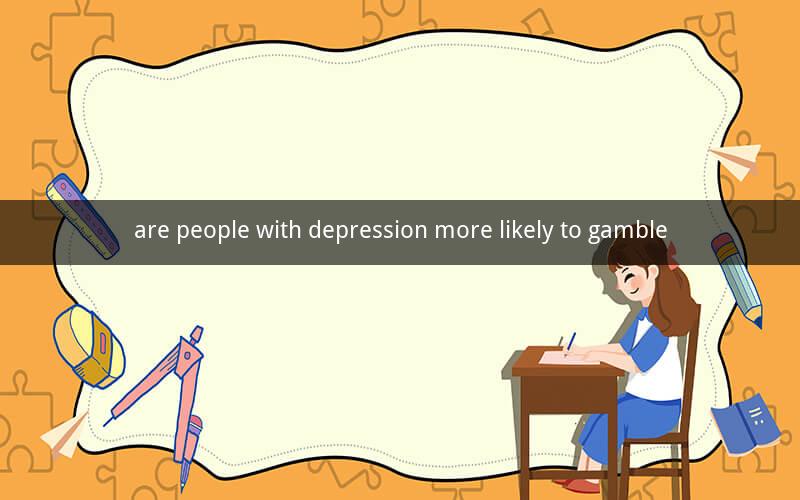
Directory
1. Introduction to Depression and Gambling
2. Understanding Depression
3. The Link Between Depression and Gambling
4. Factors Contributing to the Link
5. The Impact of Gambling on Depression
6. Treatment and Support for Depression and Gambling
7. Conclusion
1. Introduction to Depression and Gambling
Depression is a mental health disorder characterized by persistent feelings of sadness, loss of interest, and a general sense of hopelessness. It affects millions of people worldwide, leading to significant personal, social, and economic consequences. On the other hand, gambling is an activity that involves betting money or something of value on an event with an uncertain outcome. While some individuals engage in gambling responsibly, others may develop a gambling disorder, leading to severe financial, social, and psychological problems. This article explores the potential link between depression and gambling, examining the factors that contribute to this association and the impact on individuals' lives.
2. Understanding Depression
Depression can manifest in various forms, including major depressive disorder, persistent depressive disorder, and other mood disorders. Symptoms may include a loss of appetite, insomnia or oversleeping, fatigue, feelings of worthlessness or guilt, difficulty concentrating, and thoughts of death or suicide. It is crucial to recognize the signs of depression, as early detection and treatment can significantly improve outcomes.
3. The Link Between Depression and Gambling
Several studies have indicated a link between depression and gambling. Individuals with depression may turn to gambling as a form of self-medication, seeking to alleviate their symptoms or escape from reality. This association can be complex, with gambling both contributing to and being exacerbated by depression.
4. Factors Contributing to the Link
Several factors may contribute to the link between depression and gambling:
- Stress and Anxiety: Depression often coexists with stress and anxiety, which can drive individuals to seek relief through gambling.
- Impulse Control: Individuals with depression may experience impaired impulse control, leading to excessive gambling behavior.
- Seeking Reward: Depression can lead to a decreased sense of reward and pleasure, prompting individuals to seek these feelings through gambling.
- Social Isolation: Depression can lead to social isolation, which may increase the likelihood of engaging in gambling as a means of escapism.
- Cognitive Distortions: Depression can cause cognitive distortions, such as the belief that gambling can provide financial relief or that winning is inevitable.
5. The Impact of Gambling on Depression
Gambling can have a profound impact on individuals with depression, exacerbating their symptoms and leading to a cycle of increased gambling and worsening depression. Some of the potential impacts include:
- Financial Loss: Excessive gambling can lead to significant financial losses, which can further contribute to feelings of hopelessness and depression.
- Social and Family Relationships: Problematic gambling can strain relationships with family and friends, leading to social isolation and exacerbating depression.
- Legal and Employment Issues: Gambling problems can lead to legal issues and employment difficulties, further contributing to stress and depression.
- Mental Health Consequences: The combination of gambling and depression can lead to severe mental health consequences, including increased risk of suicide.
6. Treatment and Support for Depression and Gambling
Effective treatment for depression and gambling involves a multidisciplinary approach. This may include:
- Medication: Antidepressant medications can help alleviate symptoms of depression.
- Therapy: Cognitive-behavioral therapy (CBT) can help individuals develop healthier coping mechanisms and address gambling behavior.
- Support Groups: Support groups can provide individuals with a sense of community and shared experiences.
- Financial Counseling: Financial counseling can help individuals manage their gambling behavior and address any financial consequences.
7. Conclusion
The link between depression and gambling is complex and multifaceted. While depression can contribute to gambling behavior, gambling can also exacerbate depression symptoms. Recognizing the signs of both conditions is crucial, as early intervention can lead to better outcomes. By addressing the underlying factors and providing appropriate treatment and support, individuals with depression and gambling problems can improve their quality of life.
Questions and Answers
1. Q: What is the most common symptom of depression?
- A: The most common symptom of depression is persistent feelings of sadness or a loss of interest in activities.
2. Q: Can depression lead to gambling problems?
- A: Yes, depression can increase the likelihood of developing gambling problems due to factors like stress, anxiety, and impaired impulse control.
3. Q: How can medication help with depression?
- A: Medication can help alleviate symptoms of depression by altering the levels of neurotransmitters in the brain.
4. Q: What is cognitive-behavioral therapy (CBT)?
- A: CBT is a type of therapy that helps individuals identify and change negative thought patterns and behaviors.
5. Q: Can support groups help with gambling problems?
- A: Yes, support groups can provide individuals with a sense of community and shared experiences, which can be beneficial in overcoming gambling problems.
6. Q: What are some signs of problem gambling?
- A: Signs of problem gambling include lying about gambling activities, feeling remorseful after gambling, and neglecting responsibilities.
7. Q: Can stress and anxiety lead to gambling?
- A: Yes, stress and anxiety can drive individuals to seek relief through gambling, as a form of self-medication.
8. Q: How can financial counseling help with gambling problems?
- A: Financial counseling can help individuals manage their gambling behavior and address any financial consequences of their gambling.
9. Q: What is the risk of suicide in individuals with depression and gambling problems?
- A: The risk of suicide is higher in individuals with depression and gambling problems, as both conditions can exacerbate feelings of hopelessness.
10. Q: Can depression be effectively treated?
- A: Yes, depression can be effectively treated through a combination of medication, therapy, and support.